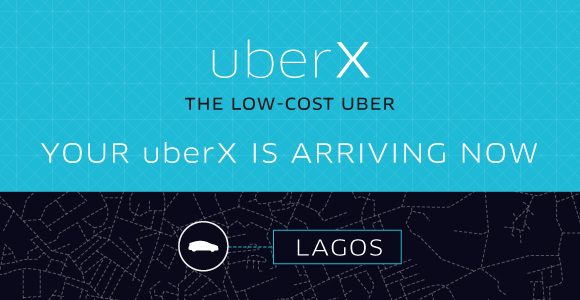TechCabal has learnt that Uber will implement a downward review in the pricing of its low cost alternative, UberX, in Lagos.
The review will chop off up to 25 percent of uber Lagos prices. Uber fares are calculated by adding a base fare to the cost per kilometer/minute ridden.
Is this a price subsidy? Is it temporary?
“No”, Uber Lagos MD, Ebi Atawodi told TechCabal in response to our inquiry when we got wind of the development. According to her, the unit economics of their model in Lagos actually make it possible to take prices down without needing to pay drivers out of Uber’s pocket.
This is potentially epic stuff. The price cut is likely to make Uber in Lagos significantly cheaper than the e-hailing alternatives, Easy Taxi and Taxipixi, and increase demand for the private taxi service by people for whom the pricing would now be more accessible.
It could even begin to undercut the regular Lagos yellow and red cabs. An Uber ride trip to the Lagos airport that would typically cost around N5,000 from the Island could now cost as low as N3,500.
This will mean that the Uber drivers in Lagos will have to drive more to make as much money as they used to. But if the economics still make sense, they will have little reason to balk at the lower fares. Guaranteed dealflow, and not having to drive around to find fares (saving on fuel) makes Uber a more compelling proposition than the current, normal taxi alternative. Uber takes 20 percent of their drivers’ earnings.
The introduction of surge pricing in Lagos since March 2015 suggests that demand for Uber transportation is already sizeable. ETAs for vehicles on the Lagos mainland for instance have gone down from 40 minutes to an average of 10 minutes. Ebi Atawodi refuses to say how many vehicles and drivers are signed up to the service in Lagos, but it appears that the recruitment has been aggressive, as the e-hailing service hustles to meet up with growing interest in the city.
The service is barely a year old in Lagos, it launched in July 2014. Uber will eventually expand to Abuja, most likely this year, but there is also no definitive word on when exactly.
In a related development, the Lagos State government has announced the launch of a Taxi License scheme that will bring more structure into a hitherto poorly regulated industry. Up till now, Uber has met virtually no resistance from taxi operators in Lagos. Most probably because said operators are still not tech savvy enough to be aware of their existence yet. Uber has however had to deal with resentment and oftentimes outright hostility from organised taxi industry in more developed markets that it operates in. How the new taxi reforms the Lagos State government will impact the nascent sharing economy wild wild west, and all its pioneers, foreign and local alike, remains to be seen.



















